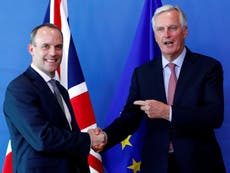Only a legal miracle can save us from a disastrous Brexit – we need to delay the whole process now
I made a Freedom of Information request to uncover the government’s progress on leaving the EU and I can’t say it filled me with hope
As UK-EU negotiations recommence, it is still unclear whether we are to have a soft Brexit, a hard Brexit or something in between. Whatever it is, as matters stand, Brexit of any kind is likely to cause massive disruption to the UK – and not just in the areas we’ve already been told about.
The UK is party to at least 759 agreements with 168 non-EU “third countries” solely by virtue of its EU membership. These agreements cover more than just trade. They cover virtually every important aspect of the UK’s economic relations with third countries: regulatory cooperation, air travel or the movement of nuclear materials, to name a few. Without them, trade and travel between the UK and third countries becomes near impossible.
The difficulty is that with Brexit – in whatever form – the UK ceases formally to be a member of the EU and therefore ceases to be party to these agreements. So those arrangements we have with third countries around the globe, agreed by the EU, will simply disappear. Commerce between the UK and those non-EU countries we keep talking about having trade agreements with, will grind to an abrupt halt.
A responsible government, you’d have thought, would have prioritised putting in place parallel agreements with third countries to take effect after Brexit. Worryingly, however, there is very little evidence that anything has been done, which means we’re now facing a real prospect of chaos.
In January, the EU even said that the UK should remain bound by agreements it has negotiated with third countries negotiated on our behalf. That’s all very well and good, but it’s not just the EU which has to agree to that. The third country in question has to also agree.
In February, the government acknowledged this in a low-key way, releasing a statement that said there didn’t need to be a full renegotiation of every treaty. Instead, only the “clear agreement” of the third countries was needed for that treaty to apply, they said.
The problem is that how to get this “clear agreement” is still unclear. Each country will have its own procedures for giving its “clear agreement”. In some perhaps an indication from the relevant ministry may be sufficient. In others, a formal statement from the head of the executive may be required. However some may stipulate more, for example that the legislature’s consent is necessary. Whatever the formal requirements, and even if the third country passes up the opportunity to re-open the agreement and extract concessions, these procedures take time; and the UK has little leverage.
In July, I made a Freedom of Information request to the Foreign Office, the Department of International Trade and the Department for Exiting the EU, to find out what progress had been made. I asked for two pieces of information: the number of third countries that had given their “clear agreement” to the continued application to the UK after Brexit of international agreements they had concluded with the EU; and the number of international agreements in relation to which third countries had given their agreement.
I received the replies a few days ago. They were essentially the same. They stated that none of the departments held the information requested. The EU would notify third countries “in due course” that during the implementation period, the UK is to continue to be treated as an EU member state and the third countries would then be able to give their “clear agreement” to the continued application of the agreements to the UK.
A number of third countries – not specified – have apparently agreed with this approach. In the meantime the government is “taking forward” discussions with third countries to put in place agreements to take effect after the implementation period. No information was given as to the progress of those discussions.
The trouble is, of course, that after Brexit on 29 March 2019 – implementation period or not – the UK is not legally a member of the EU. The UK cannot therefore benefit from agreements with third countries to which it is party, solely by virtue of its EU membership, however much the EU and the UK state that it should. As admitted by the government, the third countries also have to agree. And as also admitted, that process has barely begun.
With the best will in the world, a timescale of just over seven months to get agreement from 168 countries – even with the support of the EU – is optimistic. Barring some kind of legal miracle, there is only one solution: prolong the Article 50 negotiation period and delay Brexit.
This is the only way to preserve the UK’s legal position as an EU member state. It might also give us the chance to reflect on whether we really want to rip up our relations with the rest of the world. No doubt delay would be politically explosive for the government, but the consequences for the country of no delay could be far worse.






Join our commenting forum
Join thought-provoking conversations, follow other Independent readers and see their replies